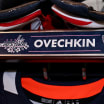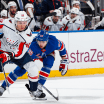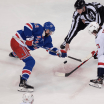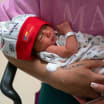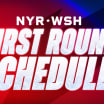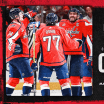Hours after announcing his retirement from the NHL, Caps defenseman Brooks
Orpik held court for the local media
in a short press conference. After that, he granted a handful of one-on-one interviews, including this one with Dump 'n Chase. As always, we are grateful for Orpik's time and his candor, and we wish him all the best in everything that comes up next in his life.
One-on-One with Brooks Orpik
Shortly after announcing his retirement from the NHL on Tuesday, Brooks Orpik chatted with Dump 'n Chase one final time
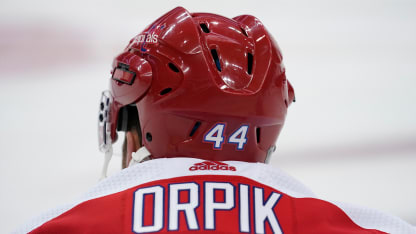
You alluded to it; you just wanted to play one game [in the NHL] and you ended up playing more than a thousand. Usually, when you set out on a journey, you have an idea of how long it's going to be. But this kind of journey, you don't really know. What are your major takeaways from spending virtually half your life in the NHL? You were drafted 19 years ago.
"Everybody always tells you it goes by quick, and I guess it does in a certain way. But in other ways, it was probably the perfect amount of time for me. I have no regrets walking away at this point. I think if I walked away any earlier, I might have had some regrets. So really, I couldn't have asked for any more in terms of what the game has given me, at least from a time standpoint. My biggest takeaway is accomplishing what was a dream growing up. At certain levels, you hear the percentage of guys who actually accomplish that, so I think realizing how lucky you are to be involved in this league for any amount of time, it's tough not to be extremely appreciative of that. As far as takeaways, it's easy to look at the hockey stuff but I think more importantly and the stuff that's really special is probably the relationships that you make along the way. Those are people who have big influences on you and shape you moving forward. A lot of those people are close friends for life."
With the benefit of hindsight - and we've talked about this before, the importance of a guy like Gary Roberts - but does anybody else stand out to you when you look back? Anybody who causes you to think, 'Man, if I hadn't met this person or forged this relationship at this point, maybe this doesn't happen or doesn't play out the way it ultimately did?'
"I think everybody tells you their parents, who obviously have a huge influence on you in terms of the sacrifices that they make in terms of getting you to where you are when you ultimately make it to the NHL. So I think everybody has a similar answer when it comes to that. Looking back, there are a lot of people who help you, so I hate picking one person, but I've actually thought about it a lot recently. There are a lot of people who help you and kind of mold you in certain ways, but the one guy that probably had the biggest influence on me was actually a strength coach that I had in college [at Boston College] by the name of John Whitesides. He left Boston College the same year that I did, in 2001 and he went to the Boston Bruins and became the strength coach there, did that for a long time. Ans it wasn't so much the strength and conditioning aspect, I think it was more the discipline aspect and pushing me out of my comfort zone. He is a guy who had a football/military background and he really held us accountable and really pushed us to places that we probably didn't think were possible. I think that created the foundation for my success as a pro moving forward. I don't know if he will see this or will want to see this, but he is probably the one guy who jumps out the most, to be honest with you."
You were saying that as this past season was winding down, you knew it was going to be your last one. That being the case, did or at any point this season - or even in the seasons before when you realize you're on the back nine, so to speak and you don't know exactly when the ride is going to end but you know it's getting closer - did you consciously stop to savor any moments, relating to the game or maybe even away from the rink?
"I think the older you get, the more you realize that your bad days really aren't too bad, especially when this is what you're doing for a living. So I think you come to the rink a lot more with a smile on your face than maybe you did when you were younger and what you thought what were your bad days weren't bad days to anybody else. I think you have a little bit of a different perspective when it comes to that. In terms of actual moments or things that I savored more, I'm 38 now, and we had our kids a little bit later than a lot of my teammates did. That's something that I was happy about, that my kids had a chance to see me play. I think anytime they could get to the game or to practice, that was pretty cool."
You mentioned the five-year deal and wanting to get through it, but without your mid-career shift and your dedication to fitness and nutrition, maybe that five-year contract doesn't even happen either. I would think you would be incredibly proud of what you built for yourself, being able to play for five more years and to win another Cup.
"Everybody is a little bit different. I've always said that what works for me might not work for the next guy. But I know that if I hadn't done it this way, I would have been out of the league a long time ago. It definitely added a lot of value to what I had to offer. I mean, I was 33 [when I signed with the Caps]; I wasn't young by any means, especially as a free agent. But I was really appreciative that [Caps GM Brian MacLellan] and ownership valued me enough that they gave me that contract. Talking to Mac, I think he was satisfied that [Matt Niskanen] and I came. Like I mentioned before, that was the goal. I didn't know if it was going to take one year or four years or five years, but if anyone guaranteed me at the beginning of the five years that I would win a Cup within the five years, you would sign up for it in a second. Getting back to the original question, I guess that's probably one of the reasons why you look back on a guy like Gary Roberts that had that effect on me, and how much you owe to them. You realize that, and especially later in your career, you try to identify some of the younger guys that want that information or want to learn from that, and you try to pass that on."
It was five years ago next week that you signed that contract, you and Nisky on the same day. You guys obviously weren't here before that, but those of us who were could see pretty instantly the impact that both of you guys made on and off the ice. What was that like for you coming in and feeling that - I don't know if 'pressure' is the right word, but they invested five years in you and were almost instantly getting crushed in the media for doing so. Was there any motivation that you drew from that, and wanting to prove people wrong?
"I honestly don't pay too much attention to that stuff. I mean, I'm not completely closed off to it. You're aware of that stuff, but I don't let it distract me or - on the other side - try to use it as motivation. I was pretty confident and comfortable with what I could bring to this group, and I think Nisky would say the same thing. One of the reasons we came here was because of the high-end talent they already had here. I think when you make up hockey teams, you can't have all of your guys playing the same style. That's just not a recipe for success, and a I think a lot of people who are new to the game don't understand that concept yet. But any good team that I played on has a great combination of different skills sets. And with that being said, you need those people to buy into whatever role they're given. The buy in and acceptance of whatever that role is, I think that's crucial to teamwide success."
You have mentioned going back to school and finishing your degree, and that being important to you. But when you wake up tomorrow, you're looking at a blank canvas and everything is different. Ideally, what do you do with that degree and what are your thoughts on what's next, with so many people reaching out and looking to help guide or direct you? You're in demand, which is not surprising at all.
"No, that's not a bad thing, either. Well, it's a communications degree that I'm working toward, and I don't think that necessarily means that it has to be communications-related. Talking to some of my friends who are working on Wall St. with English degrees and biology degrees, I think as long as you have that [degree], that's all you really need and then you can kind of figure out what you want to do. There are a lot of people that I tell that I'm going to go back to school and finish it, and they laugh at me. 'Why would you ever do that? You made this amount of money, and blah, blah, blah. I think it's just the way I am with anything. Once I start something, I am going to finish it. It's just the way I'm driven. It might not be important to other people, but it's important to me. So it might be something that I hammer out in a year, or it might take three years and I do something else on the side. I'm not really sure. I'm kind of at that stage where I'm gathering information from people, and people have been really gracious in reaching out to me with information and trying to help me. I don't think there will be a shortage of people helping me out."
I totally get the aversion to getting into coaching at this stage of your life and your family's life. As you noted, it's even more of a commitment than what you just came out of. But is something in the front office or something in development appealing to you? You've got such a good head for the game and such a wide and broad base of knowledge of what's important and what's not important, that I think you're going to find yourself in high demand whenever you decide to do whatever you're going to do.
"If that's something that people think I can add value to, it's definitely something I would consider. I guess that's part of the reason why I came down here Sunday for this development camp, was to kind of see what some of the people here do. But I don't know. I think a lot of times, you yourself have an idea of what you want to do and sometimes you tend not to listen to the people around you. But sometimes the people around you know you pretty well and know what you'd be good at, and you've got to be all ears and listen to some of those people that you respect and trust. But I might try something and wind up not liking it, and then moving on to something else - sort of trial and error - but I'm sure eventually I will settle on something that I enjoy that adds value to somebody else."
It's the end of one chapter and one era, and the beginning of another. Everybody is congratulating you as if this were something to celebrate. But for a lot of guys, it's not. But you're able to go out pretty much on your terms, a luxury many players don't have. You go into it knowing that you can't do it forever, so what do you want to do now to celebrate those last 19 years?
"I don't know, to be honest with you. I've actually had a lot of people ask me, 'Are you sad? Are you disappointed?' And I couldn't be anything further from that. I couldn't be any happier to be honest with you. There is going to be an end date, so you've got to embrace that whenever it is, and I think you've got to have a plan for whenever that does happen. Anybody who plays the game this long is going to miss it. But you also have to be realistic with yourself, and you've got to move on at the appropriate time. I think this is the appropriate time for me. But in terms of how I'm going to celebrate it, I don't know. I'm going to enjoy not having to crush my body at the end of August to get ready for training camp, so that will be a celebration within itself. But I think it will just be a lot more relaxing this summer. My kids are at a crucial age right now, at four and two, that it's important for me to be around them a lot more now. So that's a great way for me to celebrate, I think."
Do you think you will go back to some of those foods that you laid off the last several years? Maybe have a few more beers than you've had the last while, or do you just keep up with the routine?
"People have already asked me that. I just think it's one of those things that once you get away from it, you don't really have that craving or desire anymore. I think I'm more afraid of knowing how I will feel if I start doing that again after feeling the way that I do now. I'm sure I won't be as strict, but I don't think I'm going to deviate too far from the lifestyle that I've chosen. It's what works for me. It's what makes me as productive as I am, so I don't see any reason to change. I get enjoyment out of what I put into my body."
Last thing, and this is looking back at the Cup run last year. I think most of us felt like things were on the rumble strips when you guys were in double overtime, down 0-2 to Columbus in Game 3. It certainly could have turned into a quick and painful exit had it gone the other way at that point, but conversely, you guys won all four series on the road and were down in all four series. You're the only team in history to ever pull that off. Was there ever any moment, before the gloves went up in the air and the celebrations began, that you allowed yourselves to think, 'Yeah, we've still got some wins to get here, but there is no way we are going to be denied?'
"Yeah, we were down 0-2 to Columbus, we were down 3-2 to Tampa and down 0-1 to Vegas. Especially compared to previous years where I know we let doubt start creeping into the room and I know it had a negative effect on us. Even in those situations, it was just different. It's hard to describe, and nobody really needed to say anything. Everyone just had that kind of quiet belief that it wasn't really about our opponent; it was more about if we do what we are capable of doing, it will work out for us. Like in that Tampa Bay series, we were down 3-2 and they're obviously a great team, but that one was a perfect example. There was zero panic, and we won that series in Game 6, not Game 7. I mean, Game 7 mathematically wins it for you, but the reason we had success in Game 7 was because of what we did do in Game 6. And that was kind of the belief all along. Every series we played in, we just used that momentum to carry on and our confidence kept getting bigger and bigger. It had a much different feeling compared to the two years previous."






